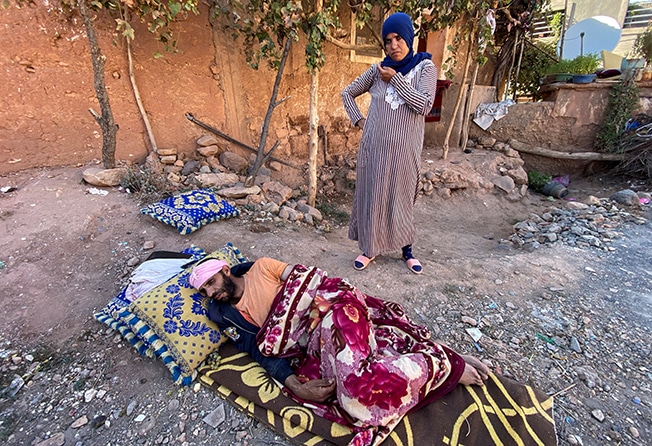Rescuers raced against time on Monday to find survivors in the rubble more than 48 hours after Morocco’s deadliest earthquake in over six decades, with nearly 2,500 killed in a disaster that devastated villages in the High Atlas Mountains.
Search teams from Spain,Britainand Qatar are joining efforts to find survivors of the 6.8 magnitude quake that struck late on Friday night 72 km (45 miles) southwest of Marrakech.
Many survivors spent a third night outside, their homes destroyed or rendered unsafe by Morocco’s most powerful earthquake since at least 1900. The death toll has climbed to 2,497 with 2,476 people injured, the state news agency reported onMonday.
In Imgdal, a village about 75 km (45 miles) south of Marrakech, women and children huddled early on Wednesday morning under makeshift tents set up along the road and next to damaged buildings. Some gathered around an open fire. Further south, a car stood crushed by boulders that had fallen from the cliff.
In the village of Tafeghaghte, Hamid ben Henna described how his eight-year-old son died under wreckage after he had gone to fetch a knife from the kitchen as the family were having their evening meal. The rest of the family survived.
With much of the quake zone in hard-to-reach areas, the full impact has yet to emerge. The authorities have not issued any estimates for the number of people still missing.
Roads blocked or obstructed by dislodged rocks have made it harder to access the hardest hit locations.
People have been salvaging possessions from the ruins of their homes and describing desperate scenes as they dug with their bare hands to find relatives.
Many structures, including homes built in traditional methods using mud bricks and timber, crumbled easily.
The damage done to Morocco’s cultural heritage has been emerging gradually. Buildings in Marrakech old city, a UNESCO World Heritage Site, were damaged. The quake also reportedly did major damage to the historically significant 12th-century Tinmel Mosque in a remote mountain area closer to the epicentre.
Survivors struggling to find shelter and supplies have voiced criticism of what they have described as an initially slow government response.
Morocco has deployed the army as part of its response and has said it is reinforcing search-and-rescue teams, providing drinking water and distributing food, tents and blankets.
It was the country’s deadliest earthquake since 1960 when a tremor was estimated to have killed at least 12,000 people.
‘MISPLACED CONTROVERSY’
In a televised statement on Sunday, government spokesperson Mustapha Baytas said every effort was being made on the ground.
King Mohammed VI had instructed the prime minister to meet on Monday with a ministerial committee that is developing emergency plans, including for home reconstruction, he added.
Neither King Mohammed nor Prime Minister Aziz Akhannouch have addressed the nation since the disaster.
King Mohammed thanked Spain, Qatar, the UK and United Arab Emirates for sending aid, state TV reported. Morocco had assessed aid needs and considered the importance of coordinating relief efforts before accepting their help, it added.
State television reported on Sunday that the government might accept relief offers from other countries and would work to coordinate them if needed.
Search-and-rescue specialists with sniffer dogs have been sent by Britain and Spain. For its part, Qatar said on Sunday its search-and-rescue team departed for Morocco. Spain said it received an official request for aid from Morocco on Sunday.
France, among the countries offering assistance, said on Sunday it stood ready to help and was awaiting a formal request from Morocco.
French Foreign Minister Catherine Colonna said it was up to Morocco whether to seek French aid.
“This is a misplaced controversy,” Colonna told BFM television when asked why Morocco had not made an official request to Paris for urgent assistance despite accepting help from Spain, Britain, Qatar and the United Arab Emirates.
“We are ready to help Morocco. It’s a sovereign Moroccan decision and it’s up to them to decide,” she said.
Paris and Rabat have had a difficult relationship in recent years notably over the issue of Western Sahara, a disputed territory that Morocco wants France to recognise as Moroccan. Morocco has not had an ambassador in Paris since January.







Click here to change your cookie preferences